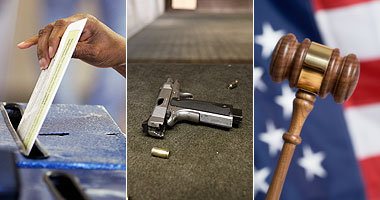
   |

Taking, and Restoring, the Rights of Felons
An article in The New York Times on Monday reported that many states are quick to restore gun rights to felons, even violent ones. In other states, people released from prison often struggle to regain the right to vote. What rights, if any, should felons lose upon conviction? When, if ever, should some be restored?
* restore = 회복시키다; 복원하다; 부활시키다/ felon = 중죄인, 흉악범/ regain = 되찾다(회복하다)
1. Misinterpreting the Right to Bear Arms
Michael Luo’s report in The Times does much to expose how the sensible case for ordinary gun ownership can so easily go astray. In general, a strong case can be made for allowing ordinary citizens to carry guns after a modest background check. These guns could be used defensively and thus in some cases could easily prevent crimes that lawless individuals might otherwise commit.
2. Risks of Permanent Punishment
If we truly want people to come out of prison with the ability to fully re-engage as productive citizens, why do we deliberately disconnect them? Denial of the right to vote is intended to signal that a person has been banished.The notion that people convicted of felony offenses deserve to lose the rights and privileges of citizenship is a vestige of outdated ideas of civil death that have no place in modern America.
3. Restore the Right to Vote
More than five million Americans are barred from voting as an automatic consequence of criminal convictions. Getting that essential right restored is, for far too many Americans, not much more than a theoretical possibility. All Americans who live in and participate in their communities should have a political voice; the health of our democracy depends on it. But the road to restoration is made unduly difficult, if not impossible, by a complicated and convoluted morass of rules that vary from state to state.
   |




